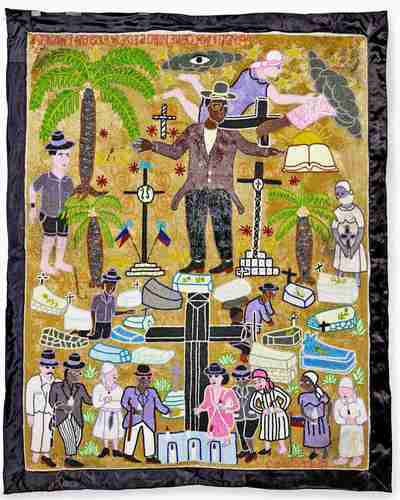Paris. The zombie as a social and religious phenomenon, still present in Haiti, is the reason for an exhibition in Paris that seeks to take the visitor to the roots of the phenomenon, far from Hollywood.
The zombification
It is a real phenomenon even in the Caribbean country, a punishment or revenge decided by an assembly of a secret voodoo society, mainly the one known as Bizango, explains Philippe Charlier, curator of the exhibition organized by the Quai Branly Museum.
It still exists, it is a kind of parallel justice
explains the expert.
The exhibition, which opens today and will remain open until February 16, reconstructs for the visitor a peristyle or religious celebration room of the voodoo rite.
In addition, there are nearly 200 works, including voodoo dolls, paintings, photographs and filmed testimonies of people who suffered this strange process, which involves the use of poisons that paralyze the victim.
One of the testimonies collected dates back to 2007. The confirmation of the death of Adeline D, 40 years old, was signed on July 26, 2007 in Limonade, near Cap Haitien
explains the poster that accompanies the victim’s photograph.
A year later, her sister, a Catholic nun, bumps into her by chance, in a market, 30 kilometers away.
add the text.
In this hidden world, the result of the syncretism of indigenous beliefs, rites of African heritage and Catholicism, when a person is accused of a crime or a simple offense, from appropriating land that is not theirs to murder, they are summoned. before a secret assembly.
Forced or of his own free will, the accused person has up to seven occasions to defend his innocence.
It is during this process, very intimidating for the victims, that dolls with pins or objects appear in front of the defendant’s home that remind him that he may end up being a zombie.
If the person fails to convince the members of the voodoo secret society, they may end up being administered a poisonous potion, the main base of which is tetrodotoxin.
At the exhibition Zombis A stuffed specimen of puffer fish is shown, from which this potentially fatal toxin is extracted.
Each boko It has its own recipe, the experts explain.
The poisoned victim falls into a coma. In Haiti, death is confirmed by two witnesses, not by the doctor
precisa Charlier.
Hours after the funeral, the person is unearthed and becomes the slave of the boko, which gives her a new identity and takes her to another part of the country.
The victim has been zombified, a penalty considered worse than death
.
This state, which is maintained through the forced ingestion of new concoctions, can last for years, adds Charlier: until the death of the bush or the will of the bewitched person himself, who manages to escape his fate.
In pop culture, the zombie symbolizes the fear of death. When a zombie bites you you become a zombie yourself. But that has nothing to do with Haiti
precisa Charlier.
